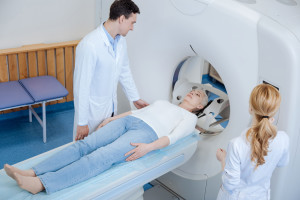 Nuclear medicine imaging uses radiopharmaceuticals, or radioactive tracers, to evaluate the bones, heart, lungs, thyroid, gallbladder, liver and other organs for diseases and conditions. Instead of just showing how the internal organs and structures look, like and x-ray, ultrasound or other imaging exam, nuclear medicine tests show how the tissues and organs function. With this information and the small amounts of radioactive tracer materials, physicians can help diagnose and treat a wide range of diseases.
Nuclear medicine imaging uses radiopharmaceuticals, or radioactive tracers, to evaluate the bones, heart, lungs, thyroid, gallbladder, liver and other organs for diseases and conditions. Instead of just showing how the internal organs and structures look, like and x-ray, ultrasound or other imaging exam, nuclear medicine tests show how the tissues and organs function. With this information and the small amounts of radioactive tracer materials, physicians can help diagnose and treat a wide range of diseases.
Nowadays, diagnostic procedures using radioactive tracers are routine. Depending on what area of the body is being tested, these radioactive tracers are either administered by an intravenous injection, inhalation, oral ingestion or are directly injected into a specific organ. After the tracers are administered the patient lies on a bed and a specially designed gamma camera is placed a few inches above their body. The camera takes pictures as the radioactive tracers move through the body, allowing the radiologist to track the path of the tracers and in many conditions, diagnose a patient’s condition.
The two main modalities of nuclear medicine:
Single photon emission computed tomography (SPECT) scans are the most commonly used type of nuclear medicine. Both SPECT and Positron emission tomography (PET) tests produce three-dimensional images of the structures and organs inside the body. The main difference between the two is the type of radioactive tracers used. For basic research, PET scans are more flexible since the radioactive tracers are easier to synthesize. The spatial resolution is far better for PET scans than SPECT scans. Additionally, SPECT expose the patients to slightly more radiation. However, the substances required for PET scans are far more expensive and are therefore performed much less frequently.
How safe is nuclear medicine
The radiation exposure from nuclear medicine is the same an individual would experience from a routine chest x-ray or CT exam. Nuclear medicine physicians always limit exposure to the very minimum necessary to get the best diagnostic results. There aren’t any known long-term side effects from the low-dose exposure experienced in nuclear medicine testing. Some potential temporary side effects include soreness, swelling or bleeding at the injection site. Allergic reactions to the radioactive tracers are very rare. Women who are pregnant or breastfeeding should notify their doctor before undergoing nuclear medicine imaging. Always discuss any medical conditions, allergies or recent illnesses to the imaging specialist before testing as well as any medications currently being taken.
How to prepare for nuclear medicine testing
Generally, there is little or no preparation necessary for the majority of nuclear medicine testing. If the physician is testing the abdomen fasting might be necessary. If the kidneys are being tested the patient might be required to drink fluids before the procedure. To ensure the most accurate results, make sure to follow any preparation directions given by the testing physician. Bring identification, insurance card and any labs or related forms if possible.
After a nuclear medicine test
After a nuclear medicine test all patients are encouraged to drink plenty of fluids. The physicians will review your images and contact you with the results, usually within a week.
Early warning detection in Houston
The imaging department at OakBend Medical Center has nuclear medicine physicians ready to test and diagnose a variety of diseases across the entire spectrum of the body. Patients are referred to their laboratory for a variety of reasons including cardiac risk factors such as smoking, high cholesterol, high blood pressure, diabetes and a history of heart disease in the family. Patients with chest pain or other high-risk symptoms can also benefit from a nuclear medicine test. These tests can also evaluate the effectiveness of medications and treatment plans.
If you are experiencing any high-risk factors you should talk to your doctor about imaging testing and healthcare screenings. Most conditions and diseases are best treated when caught early. To make an appointment or learn more about Houston area nuclear medicine testing at OakBend Medical Center please call 281-341-3000.
